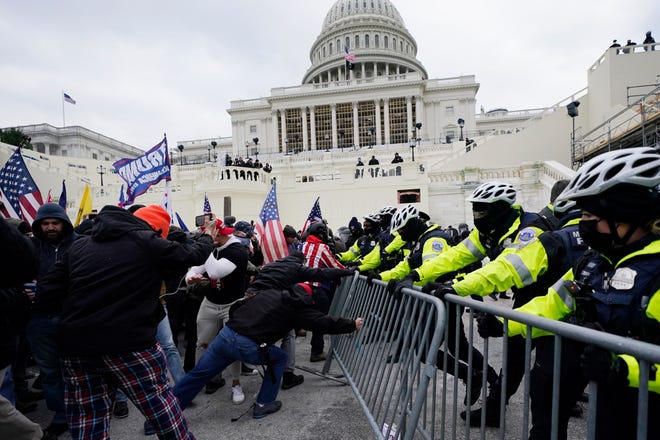Opinion: Senate must follow Portman's lead on the Capitol riot

On the night of Jan. 6, 2021, Sen. Rob Portman (R-OH) stood on the Senate floor, yards away from the door that had, only hours ago, been nearly broken down by a violent mob attempting to halt the peaceful transfer of power. In the wake of this attack, Sen. Portman issued a call to action for Congress.
"I felt it was necessary to speak," said Portman, "because I want the American people, particularly my constituents in Ohio, to see that we will not be intimidated, that we will not be disrupted from our work, that here in the citadel of democracy we will continue to do the work of the people…I’ll do my constitutional duty and oppose these efforts to reject the state-certified results."
That is why Portman joined 53 other senators and 252 House legislators from both sides of the aisle in voting for an independent and objective commission to investigate the Jan. 6 attack. In doing so, he stood with the Capitol Police, congressional staff and all those who were put in harm’s way that day.

Despite passing the House of Representatives with bipartisan support and garnering support from 54 senators across both parties, this proposal failed to clear the 60-vote threshold necessary to override a filibuster in the Senate. With the fate of the Jan. 6 commission unclear, Portman has continued to set an example for his fellow legislators to follow.
As ranking member of the Committee on Homeland Security and Governmental Affairs (HSGAC), Portman helped lead a bipartisan investigation – in partnership with the Senate Committee on Rules and Administration – into the Capitol assault. The results of this investigation were published earlier this month in a bipartisan report, which sheds new light on some of the intelligence gathering and security processes that broke down in the weeks leading up to and on Jan. 6.
This investigative work, led by Portman, must be commended. This report adds critical pieces to the Jan. 6 puzzle and offers valuable bipartisan recommendations. In particular, it highlights a lack of intelligence sharing and unclear division of responsibilities between the Capitol Police, the Department of Homeland Security, the Department of Defense and the National Guard as key failures.
However, the report also leaves many questions unanswered. Importantly, the report does not move beyond a narrow timeline to understand what conditions and incentives created the institutional failures that emerged on Jan. 6. As an officer quoted in the report offered, "1/6 was not only a result of a few months of intelligence not being analyzed and acted upon, but more so decades of failing to take infrastructure, force protection, emergency planning and training seriously."

The scope of the Jan. 6 attack requires a thorough and independent investigation – more insulated from the current partisanship of Congress – with the resources, timeframe and jurisdiction necessary to seek these answers across federal, state and local levels. Combined with ongoing investigations, a national commission would be tasked with producing a single, definitive account of this dark day in American history.
The proposal for an independent commission is designed to uncover these answers. This bill emerged out of a bipartisan collaboration between House Homeland Security Committee Chair Bennie Thompson (D-MS) and Vice Chair John Katko (R-NY), and is modeled after the bipartisan 9/11 Commission. The Jan. 6 commission would be selected and staffed by both parties, with each party having the ability to make or reject subpoena requests. No current members of Congress would be eligible to serve on the commission. This structure – which has been endorsed by the bipartisan chairmen of the 9/11 Commission – limits partisan interference into the investigation and helps ensure that all Americans have faith in the recommendations it produces.
By seeking a complete picture of exactly what happened and what went wrong that day, Portman has prioritized our nation’s security and the safety of the Capitol Police. Through his consistent leadership, he has helped our country get one step closer to ensuring that the Jan. 6 attack never occurs again. Now, it’s time for the rest of Congress to follow Sen. Portman’s lead.
Deborah Pryce is a former Republican congresswoman from Ohio. She is a member of the National Council on Election Integrity and Issue One’s bipartisan ReFormers Caucus. Zach Wamp is a former Republican congressman from Tennessee. He is a member of the National Council on Election Integrity and serves as co-chair of Issue One’s bipartisan ReFormers Caucus.

